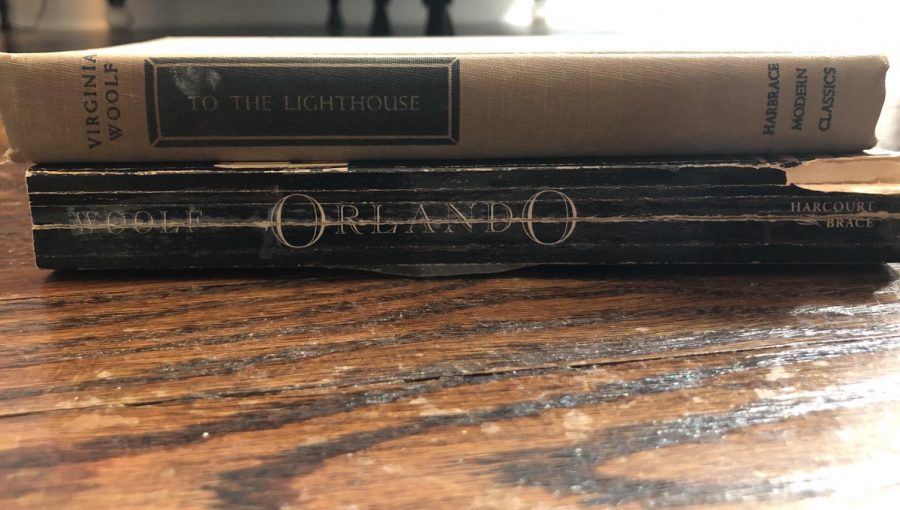No, We Can’t Go To the Lighthouse
What I learned from reading two novels by Virginia Woolf during the global Coronavirus pandemic
Pictured here are Virginia Woolf’s novels, ‘To the Lighthouse’ and ‘Orlando,’ the latter of which explores a nobleman who lives for 300 years as both a man and woman.
When I first read Virginia Woolf’s A Room of One’s Own, all I could think about was going back to school on April 20th, 2020. The novel Coronavirus pandemic was rearing its ugly head, and I could not think of anything better to do than grab the thin book by Virginia Woolf (a name I only vaguely associated with revered writers) off the top of my parents’ shelf.
The central idea of this early feminist manifesto is simple: if a woman is to discover her true genius, she must have her own room and money, conditions that most of history has failed to give her. Though the text was formal and perhaps a little outdated, I became enamored with the wit, the emotion, and the sharpness of Woolf’s words. By the time I finished the last sentence, it had become clear that pre-COVID life was not going to resume any time soon, and so I scoured the living room for another book.
A lot of my time over the next few months was spent devouring three other novels by Woolf, To the Lighthouse, Orlando, and Mrs. Dalloway. It was bizarre that I should discover these intensely profound books, much less that I should faithfully and adoringly tear through all of them. But there was something comforting in every work: though there was a world of emotion and experience contained within each, they were all (except for Orlando) centered around just one day.
Take, for example, To the Lighthouse. Most of the book revolves around the Ramsays, a family of ten, and their companions, as they prepare for a dinner in the countryside. The afternoon is not recognizably different from any other; Mr. Ramsay wanders the fields around the house, Mrs. Ramsay poses for artistic Lily Briscoe, and Paul and Minta go down to the beach. What made this story so captivating to me was not the wild adventures or exploits of the different characters, but the emotion and memories that each one experiences from the provocation of a single moment.
Much less subtly, during her day shopping for flowers and preparing her party, Clarissa Dalloway in Mrs. Dalloway is mentioned to have contracted the Spanish Flu. The global spread of this deadly virus is the closest thing that we can compare to the current novel COVID-19 pandemic; barely anything else can match the havoc and deaths that COVID-10 has caused around the world. Although she did not die from contracting the Spanish Flu, Clarissa feels its effects throughout the story in the form of heart damage, a weakened body, and psychological trauma. Her outlook on life is completely changed, and she recognizes everything as impermanent, her time for throwing parties to be fleeting.
Mrs. Dalloway serves as a crucial reminder of the physical and emotional effects of COVID-19. While many of us, especially young people, find it easy to dismiss the danger of the disease, we must recognize that it is not merely about contracting a two-week cough. No matter one’s age, contracting COVID-19 can be a painful and lingering experience; it is of the utmost importance to protect ourselves as well as those around us from its debilitating effects.
During the Coronavirus pandemic, we have given up so many things that we so often took for granted in our previously normal lives. Sitting in our house for months, the best case scenario for many, feels endless and impossibly dull; how are we supposed to create new experiences when all we have to pass the time is a television and mindless hobbies? What Mrs. Dalloway and To the Lighthouse gave me were the possibilities of what can be contained in one ordinary day. We and all of the characters within Woolf’s books have learned to make the most from the moments that we have been given, whether it is finding joy in finishing a jigsaw puzzle on quarantine day 5,000, or whether it is reminiscing about the past on a 1920’s London street.
What Mrs. Dalloway and To the Lighthouse gave me were the possibilities of what can be contained in one ordinary day.
Maggie Schneider is an Editor-in-Chief of ‘The Science Survey.’ She loves journalistic writing because it is a recognition of the infinite number of...

